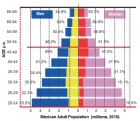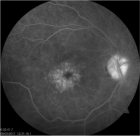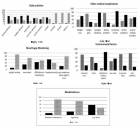Abstract
Review Article
Psychological phenomena in the doctor- Elderly patient relationship
Jose Luis Turabian*
Published: 08 April, 2020 | Volume 4 - Issue 1 | Pages: 019-023
The doctor-patient communication and the aging of the patients attended by the general practitioner are two important concepts that constantly impact medical consultations. This article raises some reflections and conceptualizations about the main psychological phenomena that have a special importance in the doctor-elderly patient communication and relationship: 1) Stereotypes and prejudices; 2) Regression; 3) Transference, countertransference and resistance; 4) Rapport; 5) Empathy; and 6) Paternalism. The GP must be alert about what affecting the communication with the old man and he should put the means to get a warm relationship. Consequently, to achieve effective communication with an older adult: The GP have to take it easy; to be patient; avoiding stereotypes and prejudices; allowing the patient to establish a benign regressive relationship, until if it is possible due to the biopsychosocial context of the elderly patient, he can begin the non-regressive relationship again; recognizing fact of transference, which put the doctor in another place, is inevitable, but taking into account that it greatly affects his relationship with the patients; avoiding countertransference; considering that the therapeutic alliance or rapport is particularly fragile in elderly patients with chronic diseases; giving greater importance to empathy; knowing that the elderly patient frequently accepts the authority of the doctor, but avoiding falling into an iatrogenic paternalism; and smile.
Read Full Article HTML DOI: 10.29328/journal.apmh.1001013 Cite this Article Read Full Article PDF
Keywords:
Elderly; Doctor-Patient Communication; Communication Skills; Prejudice; Paternalism; Empathy; Transference (Psychology); General Practice; Framework
References
- Turabian JL. Psychology of doctor-patient relationship in general medicine. Arch Community Med Public Health. 2019; 5: 62-68.
- Adler HM. The Sociophysiology of Caring in the Doctor-patient Relationship. J Gen Intern Med. 2002; 17: 883-890. PubMed: https://www.ncbi.nlm.nih.gov/pubmed/12406360
- Farin E. Patient-provider communication in chronic illness: current state of research in selected areas. Rehabilitation (Stuttg). 2010; 49: 277-291. PubMed: https://www.ncbi.nlm.nih.gov/pubmed/20963669
- Cesa-Bianchi M, Critini C, Cesa-Bianchi G.. Anziani e comunicazione tra salute e malatia. Milano: Guidotti. 2000.
- Turabian JL. Differential Characteristics in Communication and Relationship of the General Practitioner with the Elderly Patient. J Fam Med. Forecast. 2019; 2: 10-17.
- Robinson II TE, White GL, Houchins JC. Improving Communication With Older Patients: Tips From the Literature. Fam Pract Manag. 2006; 13: 73-78. PubMed: https://www.ncbi.nlm.nih.gov/pubmed/17022433
- Turabian JL. Relevant Characteristics for Elderly Patient Biopsicosocial Care in General Medicine. Archives of Community and Family Medicine. 2019; 2: 48-55.
- Reyes Ortiz CA, Gheorghiu S, Mulligan T. Oblivion of psychological phenomena in the elderly doctor-patient relationship. Colombia Médica. 1998; 29.
- Hekmat-panah J. The “Elderly” in Medicine: Ethical Issues Surrounding This Outdated and Discriminatory Term. Inquiry. 2019.
- Larsson H, Edberg A-K, Bolmsjö I, Rämgård M. Contrasts in older persons’ experiences and significant others’ perceptions of existential loneliness. Nurs Ethics. 2019; 26: 1623-1637. PubMed: https://www.ncbi.nlm.nih.gov/pubmed/29772961
- Daurella N. Basic failure and therapeutic relationship: the contribution of Michael Balint to the relational conception of psychoanalysis. Temas de Psicoanálisis. Revista de la Sociedad Española de Psicoanálisis. 2019; 18.
- Balint M. Thrills and regressions. Londres: Hogarth Press. 1959.
- Balint M. The Basic Fault: Therapeutic Aspects of Regression. Londres: Tavistock Publications. 1968.
- Kvale JN, Dayringer R. The transference phenomenon in the care of the elderly patient. Fam Med. 1987; 19: 141-143. PubMed: https://www.ncbi.nlm.nih.gov/pubmed/3596096
- Urbina-Méndez R, Hernández-Vargas CI, Hernández-Torres I, Fernández-Ortega MA, Irigoyen-Coria A. Psychodynamic Analysis of Transference and Countertransference in the Formation of Family Physicians in Mexico. Atención Familiar. 2015; 22: 33-62.
- Strachey J. The Standard Edition of the Complete Psychological Works of Sigmund Freud, Volume XII (1911-1913): The Case of Schreber, Papers on Technique and Other Works. ii-vii. The Hogarth Press and the Institute of Psycho-analysis, London. 1958.
- Teófilo TJS, Veras RFS, Silva VA, Cunha NM, Oliveira J dos S, et al. Empathy in the nurse–patient relationship in geriatric care: An integrative review. Nurs Ethics. 2019; 26: 1585–1600. PubMed: https://www.ncbi.nlm.nih.gov/pubmed/30071772
- Williams SL, Haskard KB, DiMatteo MR. The therapeutic effects of the physician-older patient relationship: Effective communication with vulnerable older patients. Clin Interv Aging. 2007; 2: 453-467. PubMed: https://www.ncbi.nlm.nih.gov/pubmed/18044195
- Coulehan JL, Platt FW, Egener B, Frankel R, Lin CT, et al. “Let Me See If I Have This Right...”: Words That Help Build Empathy. Ann Intern Med. 2001; 135: 221-227. PubMed: https://www.ncbi.nlm.nih.gov/pubmed/11487497
- Talking with Your Older Patient. Understanding Older Patients. NIH. National Institute on Aging.
- Cañete Villafranca R, Guilhem D, Brito Pérez K. Medical paternalism. Rev Med Electrón. 2013; 35.
- McKinstry B. Paternalism and the doctor-patient relationship in general practice. Br J Gen Pract. 1992; 42: 340-342. PubMed: https://www.ncbi.nlm.nih.gov/pubmed/1457157
Similar Articles
-
Psychological phenomena in the doctor- Elderly patient relationshipJose Luis Turabian*. Psychological phenomena in the doctor- Elderly patient relationship. . 2020 doi: 10.29328/journal.apmh.1001013; 4: 019-023
-
Implications on mental health by the coronavirus disease 2019 (COVID-19) pandemic: The role of general practitionerJose Luis Turabian*. Implications on mental health by the coronavirus disease 2019 (COVID-19) pandemic: The role of general practitioner. . 2020 doi: 10.29328/journal.apmh.1001016; 4: 035-041
-
Role of community health fairs in providing health services, improving health of rural residentsTrina Aguirre*,Justine Jobman,Ann Koehler,Wendy Wells,Leeza Struwe. Role of community health fairs in providing health services, improving health of rural residents. . 2020 doi: 10.29328/journal.apmh.1001017; 4: 042-045
-
Psychotropic drugs prescription block the positive effects of the doctor-patient communication and relationshipJose Luis Turabian*. Psychotropic drugs prescription block the positive effects of the doctor-patient communication and relationship. . 2021 doi: 10.29328/journal.apmh.1001029; 5: 014-017
-
Regulatory requirements and assessment of scientific research by a psychiatrist when considering the issue of assigning a qualifying doctor`s categoryShapovalov KA*,Shapovalova PK,Shapovalova LA. Regulatory requirements and assessment of scientific research by a psychiatrist when considering the issue of assigning a qualifying doctor`s category. . 2021 doi: 10.29328/journal.apmh.1001032; 5: 025-032
-
Approaching Mental Health Through a Preventive Data Analysis PlatformGabriel F Pestana, Olga Valentim*. Approaching Mental Health Through a Preventive Data Analysis Platform. . 2024 doi: 10.29328/journal.apmh.1001052; 8: 020-027
Recently Viewed
-
Obesity in Patients with Chronic Obstructive Pulmonary Disease as a Separate Clinical PhenotypeDaria A Prokonich*, Tatiana V Saprina, Ekaterina B Bukreeva. Obesity in Patients with Chronic Obstructive Pulmonary Disease as a Separate Clinical Phenotype. J Pulmonol Respir Res. 2024: doi: 10.29328/journal.jprr.1001060; 8: 053-055
-
Current Practices for Severe Alpha-1 Antitrypsin Deficiency Associated COPD and EmphysemaMJ Nicholson*, M Seigo. Current Practices for Severe Alpha-1 Antitrypsin Deficiency Associated COPD and Emphysema. J Pulmonol Respir Res. 2024: doi: 10.29328/journal.jprr.1001058; 8: 044-047
-
Navigating Neurodegenerative Disorders: A Comprehensive Review of Current and Emerging Therapies for Neurodegenerative DisordersShashikant Kharat*, Sanjana Mali*, Gayatri Korade, Rakhi Gaykar. Navigating Neurodegenerative Disorders: A Comprehensive Review of Current and Emerging Therapies for Neurodegenerative Disorders. J Neurosci Neurol Disord. 2024: doi: 10.29328/journal.jnnd.1001095; 8: 033-046
-
Metastatic Brain Melanoma: A Rare Case with Review of LiteratureNeha Singh,Gaurav Raj,Akshay Kumar,Deepak Kumar Singh,Shivansh Dixit,Kaustubh Gupta*. Metastatic Brain Melanoma: A Rare Case with Review of Literature. J Radiol Oncol. 2025: doi: 10.29328/journal.jro.1001080; 9: 050-053
-
Validation of Prognostic Scores for Attempted Vaginal Delivery in Scar UterusMouiman Soukaina*,Mourran Oumaima,Etber Amina,Zeraidi Najia,Slaoui Aziz,Baydada Aziz. Validation of Prognostic Scores for Attempted Vaginal Delivery in Scar Uterus. Clin J Obstet Gynecol. 2025: doi: 10.29328/journal.cjog.1001185; 8: 023-029
Most Viewed
-
Evaluation of Biostimulants Based on Recovered Protein Hydrolysates from Animal By-products as Plant Growth EnhancersH Pérez-Aguilar*, M Lacruz-Asaro, F Arán-Ais. Evaluation of Biostimulants Based on Recovered Protein Hydrolysates from Animal By-products as Plant Growth Enhancers. J Plant Sci Phytopathol. 2023 doi: 10.29328/journal.jpsp.1001104; 7: 042-047
-
Sinonasal Myxoma Extending into the Orbit in a 4-Year Old: A Case PresentationJulian A Purrinos*, Ramzi Younis. Sinonasal Myxoma Extending into the Orbit in a 4-Year Old: A Case Presentation. Arch Case Rep. 2024 doi: 10.29328/journal.acr.1001099; 8: 075-077
-
Feasibility study of magnetic sensing for detecting single-neuron action potentialsDenis Tonini,Kai Wu,Renata Saha,Jian-Ping Wang*. Feasibility study of magnetic sensing for detecting single-neuron action potentials. Ann Biomed Sci Eng. 2022 doi: 10.29328/journal.abse.1001018; 6: 019-029
-
Pediatric Dysgerminoma: Unveiling a Rare Ovarian TumorFaten Limaiem*, Khalil Saffar, Ahmed Halouani. Pediatric Dysgerminoma: Unveiling a Rare Ovarian Tumor. Arch Case Rep. 2024 doi: 10.29328/journal.acr.1001087; 8: 010-013
-
Physical activity can change the physiological and psychological circumstances during COVID-19 pandemic: A narrative reviewKhashayar Maroufi*. Physical activity can change the physiological and psychological circumstances during COVID-19 pandemic: A narrative review. J Sports Med Ther. 2021 doi: 10.29328/journal.jsmt.1001051; 6: 001-007

HSPI: We're glad you're here. Please click "create a new Query" if you are a new visitor to our website and need further information from us.
If you are already a member of our network and need to keep track of any developments regarding a question you have already submitted, click "take me to my Query."


















































































































































